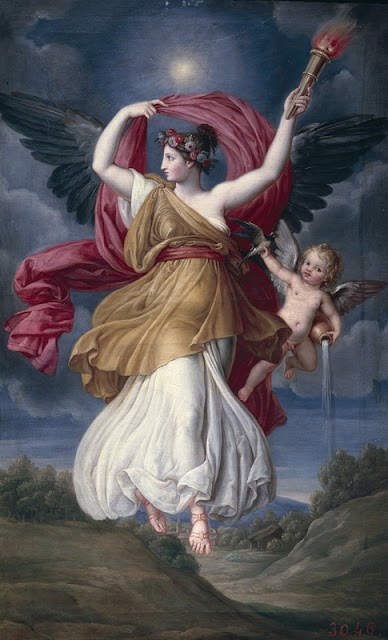EOS, gentle dawn, was the mother of the four winds. While all creation slept, she rose from her pink pillows to announce the coming of a new day. She dipped her rosy fingers into a cup filled with dew and sprinkled the drops over flowers and trees. All nature awoke, rejoicing to see her.
One morning as Eos looked down on earth, her eyes fell on a young prince waking from his slumber. He was so handsome she could not take her eyes off him, and she wanted him for her husband. But how could she, who was a goddess, be married to a mortal whose life span was so short?
As soon as her morning duties were done, she went to Zeus and persuaded him to grant eternal life to the young prince, whose name was Tithonus.
She brought him with her to her palace in the east, and they spent many delightful years together.
But Eos had forgotten to ask that Tithonus be also given eternal youth, and slowly his strength left his once-supple limbs. He shriveled and shrank, and his manly voice changed to a feeble squeak. He shrank to a tiny, wizened old man, yet he could not die, for he had been given eternal life. He became so small and weak that Eos had to put him into a little basket and hide him in a corner of her palace. There, in his dark corner, he went
on withering and shriveling till at last he turned into a grasshopper, chirping for all eternity.
But Eos stayed rosy and young, always a joy to behold when she came out to wake the sleeping world and announce the coming of her brother, the sun.
One morning as Eos looked down on earth, her eyes fell on a young prince waking from his slumber. He was so handsome she could not take her eyes off him, and she wanted him for her husband. But how could she, who was a goddess, be married to a mortal whose life span was so short?
As soon as her morning duties were done, she went to Zeus and persuaded him to grant eternal life to the young prince, whose name was Tithonus.
She brought him with her to her palace in the east, and they spent many delightful years together.
But Eos had forgotten to ask that Tithonus be also given eternal youth, and slowly his strength left his once-supple limbs. He shriveled and shrank, and his manly voice changed to a feeble squeak. He shrank to a tiny, wizened old man, yet he could not die, for he had been given eternal life. He became so small and weak that Eos had to put him into a little basket and hide him in a corner of her palace. There, in his dark corner, he went
on withering and shriveling till at last he turned into a grasshopper, chirping for all eternity.
But Eos stayed rosy and young, always a joy to behold when she came out to wake the sleeping world and announce the coming of her brother, the sun.


Comments
Post a Comment